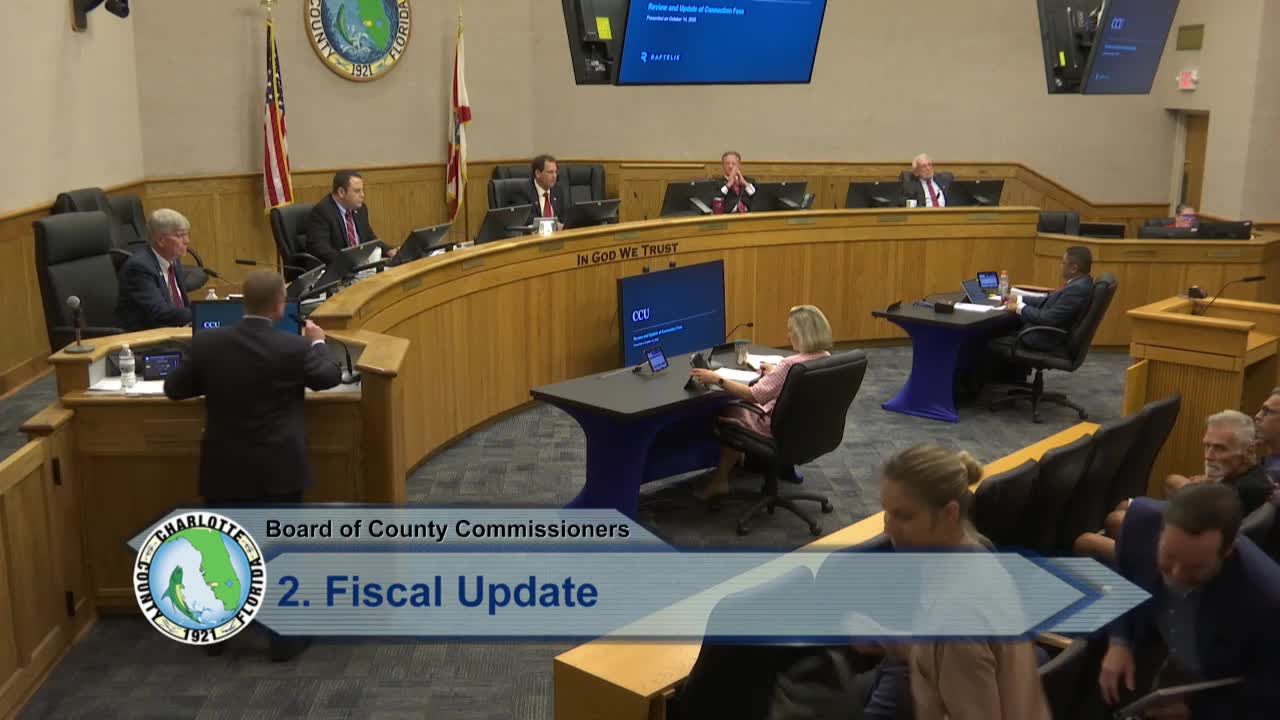Charlotte County officials weigh higher connection fees; residents press Ackerman sewer assessment concerns
Get AI-powered insights, summaries, and transcripts
Subscribe
Summary
Charlotte County commissioners heard a detailed presentation Oct. 14 on proposed updates to utility connection fees that would raise the cost to tie into the county water and sewer systems.
Charlotte County commissioners heard a detailed presentation Oct. 14 on proposed updates to utility connection fees that would raise the cost to tie into the county water and sewer systems.
The county’s fiscal team and consultant Raftelis presented three fee scenarios: an indexing update staff recommends (which would raise the combined water/wastewater capacity fee from $2,900 to about $4,050 per equivalent residential connection); a cost-based “all-in” scenario that produces a combined fee of about $7,910; and an incremental approach focused on near-term plant expansions that would yield a combined fee near $6,940. Rick Arthur, the county’s fiscal services manager, told commissioners the staff-recommended index would be included in a resolution to be advertised and set for public hearing on Dec. 9, with any adopted fee to take effect March 1, 2026.
Why it matters: the county faces large planned capital investments — notably expansions tied to the Peace River regional water supply and wastewater plant work at Eastport, Burnt Store and Westport — and the consultants said connection fees should reflect a mix of existing system buy-in and the cost of new capacity. Murray Hamilton of Raftelis summarized apportionments showing roughly $423 million in existing plant and near-term CIP that were considered in the capacity fee calculations and a set of future-only expansion costs that would be borne entirely by new customers.
Public pushback: During the meeting’s public-input period, two residents questioned assessments tied to local sewer projects. Michael Long (identified in the record as a resident of Hartmut Circle, Port Charlotte) told commissioners the Ackerman sewer MSBU assessment had risen far above earlier estimates — from about $11,500 originally to $25,000+ — and that some residents are being asked to stretch payments over 40 years to keep annual charges lower. He asked where previously promised BP funds or other subsidies had gone and pressed whether the county was honoring prior agreements. Phil Smallwood, another resident who said he had toured Burnt Store plant operations, urged clearer allocation of costs so existing ratepayers are not left covering what he described as builders’ responsibility to fund growth-driven expansions.
What staff will do next: Arthur and Raftelis told the board they will return at the Oct. 28 regular meeting asking the board to set a Dec. 9 public hearing on the proposed changes, including the proposed 3.5% annual indexing mechanism. Commissioners asked for more granular breakdowns by neighborhood and for staff to bring a full-cost scenario (the “all-in” approach) to the hearing so the board and public can compare options.
Quotes from the meeting: Murray Hamilton (Raftelis) summarized the methodology and apportionment approach. Rick Arthur (Fiscal Services) said the index resolution would be teed up so the county could apply it on March 1 if adopted and then revisit annual indexing in July. Michael Long told commissioners, “We had an overall contract with the commission five years ago…when you make a deal with people, you keep the deal,” expressing the phase’s residents’ anger about higher assessments.
Outlook: County staff plans to present a formal resolution in late October to set a Dec. 9 public hearing. The board signaled interest in one or more of the higher-fee options, including moving to a long-term “total cost” approach, while also asking staff to preserve indexing so fees keep pace with construction inflation. The Ackerman residents’ comments are likely to surface again during the scheduled public hearing.
Ending: Commissioners did not act to adopt new fees at the Oct. 14 session; they were briefed and asked staff to return with the formal hearing item. The county’s public hearing on connection fees is set for Dec. 9, 2025, when the board will consider moving to one of the fee scenarios explained in the Raftelis analysis.
